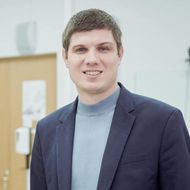HSE University Brings Together Researchers at International AI Summer Institute in Shanghai
In early July 2025, the International Summer Institute on Artificial Intelligence in Education took place in Shanghai. It was organised by the HSE Institute of Education in cooperation with East China Normal University (ECNU). More than 50 early-career researchers and keynote speakers from nine countries—ranging from Russia and China to Canada and Singapore—gathered to share the latest findings from their work and to forge new international partnerships.
Opening the International Summer Institute, Evgeniy Terentev, Director of the HSE Institute of Education, emphasised that AI is no longer an abstract topic for discussion but has become ‘a tool for everyday academic practice, and the question now is not whether to implement it, but how to do so effectively.’

Evgeniy Terentev
The first day was devoted to setting the goals and objectives for the week’s work at the institute. Evgeniy Terentev presented an analysis of how Russian universities are responding to generative AI models, while Yaroslav Kuzminov, Academic Supervisor at HSE University, offered a global overview of how artificial intelligence is being integrated into higher education systems. Ekaterina Kruchinskaia illustrated, through concrete examples, how generative AI is being used by university students in Russia. Renowned international scholars Okan Bulut from the University of Alberta (Canada) and Mik Fanguy from the Education University of Hong Kong discussed the risks associated with the ‘black box’ of AI, and the need to rethink computer-supported collaborative learning in the era of large language models. The day concluded with an academic ‘speed dating’ session: participants not only found potential future co-authors but also had the chance to surprise and congratulate a fellow researcher whose birthday came to light unexpectedly.

Maksim Nikitin
‘It was crucial for us not only to deliver a rich academic programme, but also to strengthen our partnership with our Chinese colleagues,’ noted Maksim Nikitin, Expert at the HSE Institute of Education and Head of the 2025 Summer Institute’s Organising Committee. ‘East China Normal University is a reliable and engaged co-organiser. We already have several substantial joint projects with them, and we are certainly planning to expand that cooperation. It was especially gratifying to witness the international partnerships in action and to see such a high number of strong applications from all over the world. This shows that interest in AI in education is truly global—and HSE holds a leading position in this scientific field.’
The rest of the programme unfolded across three parallel academic tracks, where theoretical discussions gradually transitioned into practical workshops. The ‘Skills and Generative AI’ track hosted lively debate on the rapidly evolving labour market and how different theoretical frameworks describe these transformations.


Vera Maltseva
‘Our Summer Institute proved to be genuinely interdisciplinary and international. It was encouraging to see that we managed to go beyond purely pedagogical and sociological approaches in analysing AI’s impact, incorporating crucial economic perspectives as well. This has allowed for a more holistic understanding of such a profound transformation. Thanks to this, we’ve expanded our network of professional contacts and partners, with whom we can now develop joint research initiatives,’ said Vera Maltseva, Director of the Centre for Vocational Education and Skills Development and mentor of the track.
The pedagogical track focused on the use of generative AI directly in the learning process, while the psychometrics track explored how to validate tests and conduct data analysis in education, with some functions handed over to AI assistants.
On one of the days, participants swapped laptops and notebooks for cameras, ascending the Shanghai Tower, strolling through the Yu Garden, and later enjoying a river cruise on the Huangpu while watching the summer sunset.
The Summer Institute concluded with the presentation of participants’ research projects. These included a variety of concepts—from an adaptive assistant for school pupils to a study of how generative AI is used in doctoral education. Experts provided detailed feedback and recommendations on how to strengthen the projects, and together with the participants identified key areas for further development.
‘It was a great honour and pleasure to be part of this year’s International Summer Institute hosted by the HSE Institute of Education. I was especially impressed by the lectures on the first day—the depth and scale of the ideas presented by the speakers gave me a lot to reflect on in my own research. I am grateful to Vera Maltseva and all the colleagues for their constructive feedback—their comments were not only motivating but also appropriately challenging, which really helped me clarify my next steps. This was an exceptionally valuable experience, and I sincerely hope our collaboration does not end with the institute. I look forward to opportunities for joint research with colleagues from HSE. I am confident this is only the beginning of a fruitful dialogue,’ shared Jade Zhao, a participant from China and student on the EdD programme at Xi’an Jiaotong-Liverpool University (XJTLU).
Closing the programme, Evgeniy Terentev thanked the participants for creating a ‘laboratory of collaboration,’ and the group agreed to continue working together in the future.
The next Summer Institute organised by HSE’s Institute of Education is scheduled for summer 2026. Applications will open in February.
See also:
HSE Tops Ranking of Universities Participating in Priority 2030 Programme
The Russian Ministry of Science and Higher Education has published an updated list of participants in the Priority 2030 programme. A total of 106 universities will receive support this year. HSE University was included in the first group and topped the ranking.
‘Keep Working, Keep Publishing—Consistency Matters’
Ziyuan Zhu, from Beijing, China, is an international PhD student at the Institute for Public Administration and Governance at HSE University in Moscow. In this interview with the HSE News Service, Ziyuan talks about how studies can influence one’s outlook on life, comparing public service models in different countries, and why being a Chinese student in Russia is advantageous in research.
HSE Psycholinguists Launch Digital Tool to Spot Dyslexia in Children
Specialists from HSE University's Centre for Language and Brain have introduced LexiMetr, a new digital tool for diagnosing dyslexia in primary school students. This is the first standardised application in Russia that enables fast and reliable assessment of children’s reading skills to identify dyslexia or the risk of developing it. The application is available on the RuStore platform and runs on Android tablets.
HSE University to Join Physical AI Garage Project by Yandex
Yandex is collaborating with leading Russian universities to launch a new educational programme called Physical AI Garage. This initiative unites five universities—HSE University, ITMO, MIPT, MAI, and MEPhI—to train future professionals in physical artificial intelligence by tackling real-world industrial challenges. The programme is free, and participants will receive scholarships.
HSE Scientists Optimise Training of Generative Flow Networks
Researchers at the HSE Faculty of Computer Science have optimised the training method for generative flow neural networks to handle unstructured tasks, which could make the search for new drugs more efficient. The results of their work were presented at ICLR 2025, one of the world’s leading conferences on machine learning. The paper is available at Arxiv.org.
Under a Blooming Magnolia: How Russian and Chinese Scientists Create Solar Cells of the Future
Schola continues to introduce the winners of the International Academic Cooperation competition. In today's issue, Professor Andrey Vasenko, Deputy Head of the Scientific and Educational Laboratory of Quantum Nanoelectronics at Tikhonov Moscow Institute of Electronics and Mathematics (MIEM), speaks about the joint project between his laboratory and the Peking University research team— ‘Engineering of highly efficient and stable perovskite solar cells.’
Physicists Propose New Mechanism to Enhance Superconductivity with 'Quantum Glue'
A team of researchers, including scientists from HSE MIEM, has demonstrated that defects in a material can enhance, rather than hinder, superconductivity. This occurs through interaction between defective and cleaner regions, which creates a 'quantum glue'—a uniform component that binds distinct superconducting regions into a single network. Calculations confirm that this mechanism could aid in developing superconductors that operate at higher temperatures. The study has been published in Communications Physics.
Neural Network Trained to Predict Crises in Russian Stock Market
Economists from HSE University have developed a neural network model that can predict the onset of a short-term stock market crisis with over 83% accuracy, one day in advance. The model performs well even on complex, imbalanced data and incorporates not only economic indicators but also investor sentiment. The paper by Tamara Teplova, Maksim Fayzulin, and Aleksei Kurkin from the Centre for Financial Research and Data Analytics at the HSE Faculty of Economic Sciences has been published in Socio-Economic Planning Sciences.
Graduate School of Business MBA Students Take Part in Offsite Module in China
MBA students of the HSE Graduate School of Business HSHSE have recently completed the international component of their studies at the School of Economics and Management at Tsinghua University. The module focused on developing business through innovation. The participants discussed the impact of new technologies on corporate structures and visited companies operating in robotics and renewable energy.
Larger Groups of Students Use AI More Effectively in Learning
Researchers at the Institute of Education and the Faculty of Economic Sciences at HSE University have studied what factors determine the success of student group projects when they are completed with the help of artificial intelligence (AI). Their findings suggest that, in addition to the knowledge level of the team members, the size of the group also plays a significant role—the larger it is, the more efficient the process becomes. The study was published in Innovations in Education and Teaching International.


